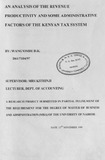| dc.contributor.author | Wang'ombe, D. K. | |
| dc.date.accessioned | 2013-06-26T09:28:23Z | |
| dc.date.available | 2013-06-26T09:28:23Z | |
| dc.date.issued | 1999-11 | |
| dc.identifier.citation | Masters of Business Administration, University of Nairobi (1999) | en |
| dc.identifier.uri | http://erepository.uonbi.ac.ke:8080/xmlui/handle/123456789/40331 | |
| dc.description.abstract | This study evaluates the Revenue Productivity of the tax system in Kenya and some factors
affecting such productivity. The productivity is measured through Buoyancy and elasticity.
The coefficients are measured through log regression of the taxes to the Gross Domestic
Product. The period of the study is 1989-1998. The adjustment for discretionary effects is
made using the proportional adjustment method.
The analysis shows that there has been considerable improvement of the tax revenue
productivity and that the reforms made in this period had significant effect on the
responsiveness of the tax system. The Buoyancy coefficient for the overall tax system is 1.27
while elasticity was 1.26. The tax system therefore, responded adequately to the changes in
National Income. All the taxes except VAT had responsiveness greater than unity. Excise
duty had the highest buoyancy and elasticity coefficients. Introduction of VAT to replace sales
tax has not yet improved the tax system productivity thus there is a need to improve
performance of VAT.
The other objective of the study was to evaluate the factors affecting tax productivity. This
study revealed that there is need to improve on the following: -
1) Locating taxpayer through registration.
2) Check on taxpayer compliance.
3) Resolution of controversies between taxpayer and tax officers.
4) Improve collection of taxes.
5) Penalties Application.
6) Policies on employment.
ix
Kenya Revenue Authority has already started these measures. However, Kenya Revenue
Authority requires time and resources to exact some impact on the tax system.
The taxpayers attitude survey showed that generally there is a negative attitude towards the
tax system. This attitude is not confined to one sector or a certain size but cuts across all
areas.
The factors affecting the attitude were identified to include:
1) Fairness of the tax system
2) Application of controls
3) Information provision
4) Use to which tax Revenue is put
5) Efficiency of tax administration
6) Cost of the tax system to taxpayer
7) Convenience
This provides areas that the tax authority should correct to improve the image it has to
taxpayers. With the steps taken by Kenya Revenue Authority it will be a matter of time and
resources to change this taxpayer image. In additional to measures taken, Kenya Revenue
Authority must embark on promotional activities to sensitize society on tax issues and most
important, it must be accorded political autonomy to make it effective. | en |
| dc.language.iso | en | en |
| dc.publisher | University of Nairobi, | en |
| dc.title | An analysis of the revenue productivity and some administrative factors of the Kenyan tax system | en |
| dc.type | Thesis | en |
| local.publisher | School of Business | en |

